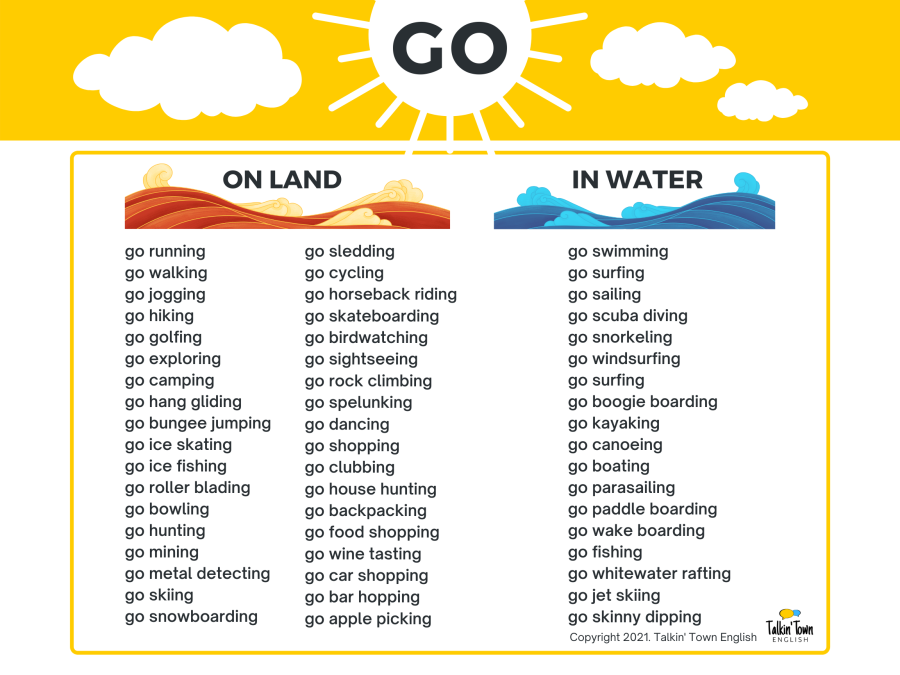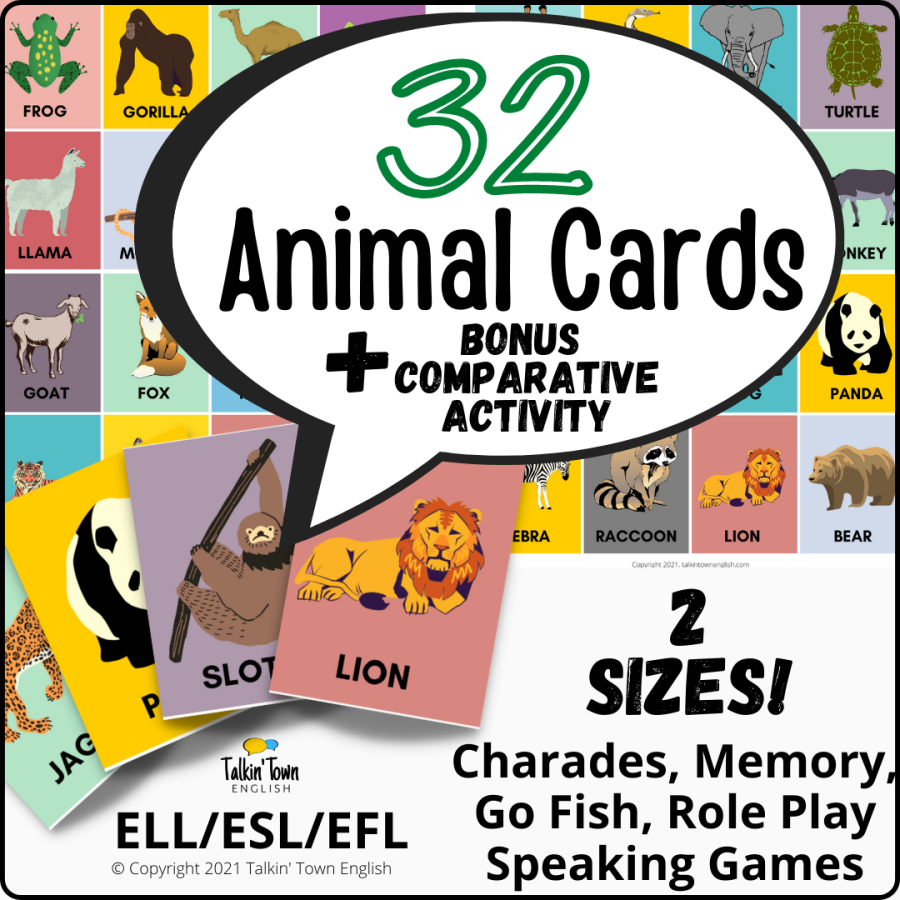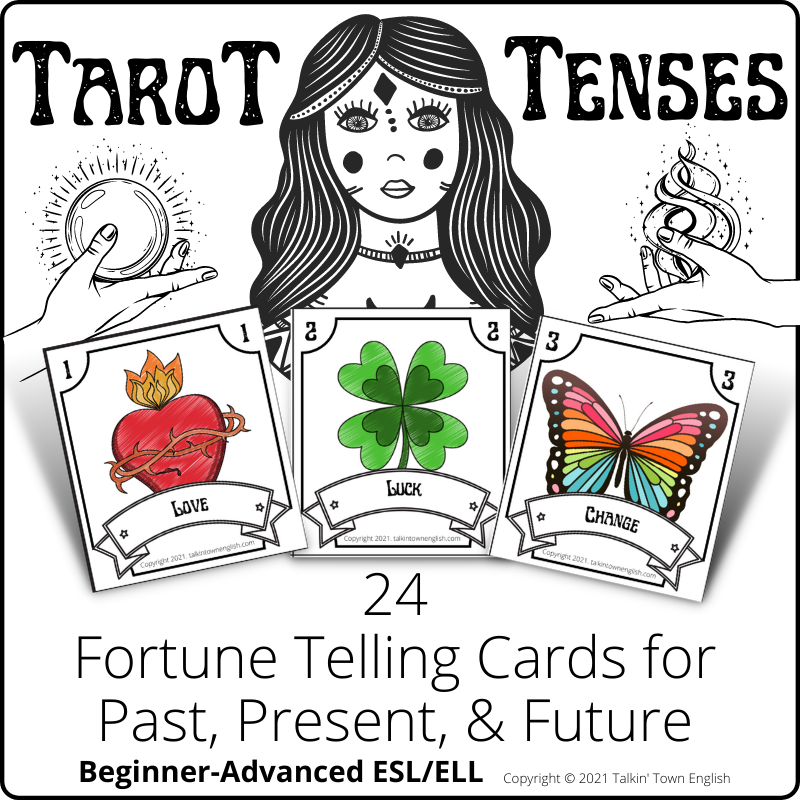
Breaking News! ESL Students prefer playing games to studying grammar.
Thanks, Captain Obvious. Now, let’s really drive it home:
Hello, students! Raise your hand if you want to study grammar. (crickets.)
Raise your hand if you want to play a game. (48 hands are up in a class of 24.)
What have we learned from this example? Contrary to the popular belief that studying grammar should be serious and structured, games actually help students produce language that is communicative and functional on the spot. In other words, if you want to teach grammar without turning your students into crickets, you’ve got to disguise it as a game.
To this end, I’ve collected four of my favorite card game variations that I use throughout the year in my adult ESL classes. Read on to learn how to play each variation, and how your students can benefit from card games, which are both fun and FUNctional. Your students will be so happy you did.
Go Fish-ing
Targets: Gerunds, Simple Present Question Forms, Articles (a, an, 0)
Number of Players: 4-10 students, (decks of at least 50 cards, more for larger sized classes)
How To Play
This game is played in the same fashion as traditional Go Fish. Use any deck of cards that contains four matching images. Use multiple decks for larger class sizes. Deal five cards to each student in a circle, and place the remaining cards in a pile in the center of the circle.
- Students take turns asking a player for a match to one of their cards: Do you have a/an _____, any _______?
- If the student does have the card, they must give the card to the asker. (As well as any additional matching cards they may have collected.) The player may then ask any player again for another matching card.
- If the player they have asked does not have the card, that player must answer: Go Fishing! Then the asker must choose a card from the pile.
- Now here’s where the game varies from the traditional form: After the first player uses the phrase, “Go Fishing!”, the next player must use another form of Go + VING. So they can say, “Go surfing!” or “Go swimming!” GO phrases can only be used once. If the player does not remember to use the GO phrase, the asker is allowed to ask another player another question instead of choosing from the deck.
- The game continues until all cards have been matched. The player who has collected the most matches wins.

Tense Taboo
Targets: Verb Tenses, Vocabulary

This is another ESL classroom favorite, but have you ever played it using different tenses? It works like this:
The first player draws a secret card and then describes the card to their classmates. Traditional taboo contains illegal words that cannot be used, but I don’t usually include that feature with my beginner students. It’s too challenging and makes the game less fun. I do enforce rules, like no body language, noises, or mouthing the words. Students will definitely know the meaning of the word “cheating” by the end of the game!
How To Play
In order to use my variation, the player must describe their item in a target tense: past, present, future, etc. So if a student must describe a horse in the past tense, they would say something like, “It was fast. It had large eyes, it ran fast, and it lived in the fields.” Tense Taboo adds an extra dimension to the game that is silly enough to still be fun, but incredibly productive in getting students to think and speak in a target tense during play.
You can find 192 different playing cards that are great for Taboo here.
Comparatives War
Targets: Comparative and Superlative Forms
This is a variation on the classic game of War, where the person who has the higher card takes both cards. To play this variation, divide a deck of topic picture cards, for example, Animals, and give each player half the deck.
How To Play
- Choose a target adjective, like big, dangerous, or fast. The two players flip a card simultaneously, and whoever has the winning comparative animal takes both cards. For example, if Student A flips over a turtle and Student B flips over a horse, Student B takes both cards because the horse is faster. Encourage students to use phrases like, “My animal is faster than yours!” as they collect their winnings.
- If players draw two cards that are equal in speed, size, intelligence, etc…, they will then add three more cards to their pile and flip the fourth card, which will determine who wins the round. Winner takes all cards.
- If the flip cards in an equal battle are again equal for that adjective, players add three more cards and flip another final fourth card to determine the winner. Winner takes all.
- Play continues until one player has won all the cards in the deck.
- To practice superlatives, place students in groups of three and divide the deck equally among them. Player flip their cards simultaneously and decide whose card is the fastest, the biggest, the most colorful, etc.
Grab a printable deck of 32 animal, food, job, and insect cards here!
Tarot Tenses
Targets: Verb Tenses, Abstract Nouns, Question Forms
Tarot Cards have been around for centuries, and it’s no wonder. Who doesn’t love getting a glimpse into their future? I’ve used my own tarot cards in class, and they’re always a huge hit–students can hardly wait until it’s their turn for a reading. The major problem with using real tarot card decks in class is that some of the cards depict ideas such as death, sickness, and the devil, and those cards can really cast a negative shadow over the activity.

To avoid any morbid readings in class, I’ve designed my own deck of major tarot cards, specifically chosen for classroom use. I printed them out and laminated them so I can break them out every year around Halloween. I dress up as a fortune teller and let students discover their true destiny: fluency in English!
The grammar aspect is built right in. Students choose three cards in order, a past, present, and future card. The card reader reveals their cosmic message using appropriate verb tenses for each card. So a Love Card in the past position means that the student had a great love, but maybe they broke up or it ended. It’s also a great activity for practicing question forms (Will I ever be in love again?), predictions, and abstract nouns, such as Patience, Charity, Time, and Recognition. Grab a deck and cast a spell of amazement over your classroom. I predict that every student in the room will be fully engaged in this crafty card game variation.
I hope you enjoy using some (or all) of these card game variations with your ESL and emerging English learners in class. Much respect to all the grammar-gamers out there!
Do you have your own spins on classic card games you love to use in the classroom? I’d love to hear about them in the comments below. Tag, you’re it!




